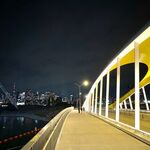The Trudeau government is revamping its approach to modern-day slavery, promising new legislation that caught off guard the Liberal MP who has been steering a bill on forced labour through Parliament.
"There is a limited lifespan to this Parliament," Toronto MP John McKay said in an interview.
McKay has been stickhandling Bill S-211, which would update Canada's laws of forced labour and child labour in supply chains.
The bill is nearing its final phase before becoming law as soon as this month. It would require Canadian firms and government departments to scrutinize supply chains, with the aim of protecting workers.
Firms would have to check that none of their products or components are made in sweatshops employing children or people forced to work excessive hours for free or for paltry pay, and issue reports.
The bill was first tabled in the upper chamber by Sen. Julie Miville-Dechêne, whose office did not respond to an interview request.
Miville-Dechêne has previously warned that products including coffee, cocoa and sugar cane may be linked to child labour or made in factories in the Xinjiang region of China where members of the Uyghur community are forced to work.
The bill has been criticized by the NDP, Bloc Québécois and human-rights advocates for imposing only a duty to report instead of actually weeding out things like child labour.
They argue the reporting requirement falls short of the Liberals' platform commitment "to eradicate forced labour from Canadian supply chains."
McKay said that's the result of what is politically possible, and would introduce more transparency in Canada than many other countries.
"It's where you're coming from to where you're going to, and right now we're at Ground Zero, because we have no legislation," he said, arguing consumers and bankers could use the information to pressure corporations.
"Hopefully with some generation of the information we could move to more onerous pieces of legislation, where companies who don't comply expose themselves to lawsuits," said McKay, who said his government hadn't informed him of what the new bill will entail.
Labour Minister Seamus O'Regan was not available for an interview for three days during the Liberals' post-budget tour.
But his office said the intent of the new legislation is to create an impetus for firms and governments to actually act when they identify an instance of forced labour.
"We're eradicating forced labour from Canadian supply chains," O'Regan said in a supplied statement.
"My job is to make sure we draft the most effective legislation possible that not only identifies these goods, but has the teeth to act on them. It will send a clear message to the world: forced labour has no place in Canada."
McKay said he hopes O'Regan tables something fast.
"I would hope that he would introduce whatever he has in mind sooner than later," he said.
"He's clear that he wants to do something that is fairly robust, and I'm doing nothing but encouraging him to do so."
The Uyghur Rights Advocacy Project has called Bill S-221 "weak legislation" and argued that Canada already has tools and obligations under the Customs Act to prevent goods made through slavery from entering supply chains.
"As other governments are making strides in addressing goods produced by the use of Uyghur forced labour, Canada is falling behind," the group wrote in a news release on March 28.
"Responses to this topic have ranged from denial of a problem to limitations in Canadian law, to lack of access to information."
This report by The Canadian Press was first published April 8, 2023.






